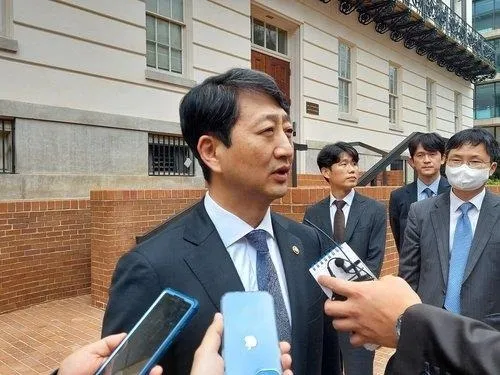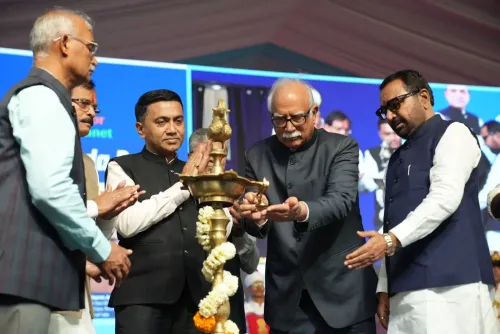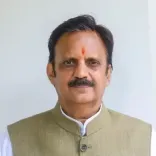South Korea Aims for Removal from US 'Sensitive' Nations List: Industry Minister

Synopsis
Key Takeaways
- South Korea seeks removal from the DOE's sensitive list.
- Discussions will include energy cooperation and technology.
- Concerns about potential restrictions on collaboration.
- Exploring exemptions from U.S. tariffs.
- Dialogue with Alaskan authorities on gas projects.
Seoul, March 20 (NationPress) South Korea is set to pursue the removal from the US Department of Energy's (DOE) list of "sensitive" nations while aiming to enhance bilateral energy cooperation, stated the industry minister on Thursday.
Industry Minister Ahn Duk-geun made these comments prior to his departure for Washington on a two-day visit to engage with U.S. officials, including Secretary of Energy Chris Wright and Secretary of Commerce Howard Lutnick, among others.
"We are exploring various alternatives, including seeking an exclusion from the DOE list, to ensure that this matter does not adversely affect local industries and technological collaboration between South Korea and the U.S.," Ahn noted, as reported by Yonhap news agency.
This visit comes amidst worries that the DOE's classification of South Korea on its "sensitive and other designated countries list" could introduce potential new limitations on scientific and technological cooperation between the two nations. It follows closely on the heels of his last trip to the U.S. just three weeks prior.
"The industry ministry understands that the inclusion was based on technical security concerns as previously stated by the foreign ministry," Ahn remarked, adding that he intends to address the U.S. administration's worries regarding these matters during his upcoming meeting with Wright.
The agenda for the discussions will also include enhancing bilateral collaboration in energy sectors such as nuclear power plants, small modular reactors, and gas, he further stated.
On his scheduled meeting with Alaska Governor Mike Dunleavy next week, Ahn mentioned that they would discuss the Alaskan government's proposal for a gas pipeline project to evaluate its economic viability and the potential involvement of Korean companies.
"It is evident that the U.S. administration maintains a strong position on tariffs ... should we obtain an exemption, we would pursue it, but if not, the government will continue negotiations with the U.S. to mitigate adverse effects on Korean industries," he explained.
Regarding recent comments by U.S. Treasury Secretary Scott Bessent about the "Dirty-15" nations with elevated tariffs on U.S. products, Ahn stated that it remains "unclear" if South Korea is included in that list.
"There is virtually no tariff on U.S. imports under our bilateral free trade agreement, yet there are some non-tariff barrier issues raised by the U.S., and government agencies are collaborating to tackle these concerns," Ahn elaborated.
In a recent dialogue with South Korea's trade minister, U.S. Trade Representative Jamieson Greer reportedly highlighted Seoul's sanitary and phytosanitary measures regarding U.S. agricultural products, restrictions on South Korea's geographic data for Google Maps, and digital regulations, raising alarms that the U.S. might interpret such matters as non-tariff barriers to press South Korea.
"As the current circumstances are not something that can be resolved immediately, we are striving to build credibility with the U.S. and cultivate the most favorable environment for local industries whenever Washington announces new policies or alters its tariff strategies," Ahn clarified.









